#Washington Free Beacon
Link
"I’m shocked and disappointed by Caterpillar’s decision to move its HQ from Illinois," Duckworth said on Twitter. "While this will only directly affect about 1.5 percent of IL-based employees, I'll keep working to encourage Caterpillar to preserve jobs and follow through on its promise to hire even more Illinoisans."
Caterpillar, a Chicago area-based company with more than $50 billion in annual revenue, announced it will set up its new headquarters outside Dallas, saying the move is "in the best strategic interest of the company."
The manufacturer's move marks the second time in recent weeks that a major corporation announced it would move its headquarters out of the Democrat-governed state. Last month, Boeing said it would move its headquarters from Chicago to Arlington, Va.
#IL#Democrats#TX#Washington Free Beacon#Tammy Duckworth#construction#manufacturing#Philip Caldwell#Caterpillar
7 notes
·
View notes
Text
KE AUPUNI UPDATE - AUGUST 2023

Food Sovereignty
The tragedy in Lāhainā continues to unfold. A century and a half of reckless resource management, especially land use and water allocation, in favor of commercial greed — first, massive plantations, then massive tourism, then massive developments and land speculation — have put much of Hawaii in grave danger of not only what transpired in Lāhainā, but in other serious ways as well.
Add to that the real-time bureaucratic mentality of state officials who put strict obedience to rules and orders before common sense and people’s lives, and you have a formula for disaster.
Under the U.S. system, money is the measure of importance. Corporations and companies that generate money are highly favored and receive first priority, even when it comes to law. Ordinary people like you and me are not seen as living, breathing human beings. We are taxpayers, whose labor and energy are revenue streams to feed the system.
In that system, nature is something to be exploited, not cared for. Original languages and cultures are only allowed if they have commercial value. (Ironically, our songs, the hula, and our language, like the word Aloha, survived because they were money-makers for the tourism industry)
This is the colonial system that has permeated practically every nook and cranny of the world. Not only has it disrupted, polluted and disfigured native habitats, destroyed native economies and social systems, it has altered what we eat — unhealthy processed and ʻjunkʻ food causing catastrophic health problems among native people. Then there is the perilous dependency on importing what we eat.
Ninety percent of the food consumed in Hawaii is shipped in from the States. That means, only ten percent is grown in Hawaii. If shipping was to stop, after two weeks, Hawaii will run out of food and things will get very ugly.
Hawaii will never be truly independent, unless we can feed ourselves.
For the past 20 years those who have been aware of Hawaii’s vulnerability have been sounding the alarm and some progress is being made in planting more food crops. There are many who are answering the call of back to the ‘aina to plant for our future.
But there needs to be a concerted effort to not only grow more food, but to change the diet habits of our people to eat the fantastically nutritious traditional foods that our ancestors brought in their canoes, like Kalo (Taro)...ʻUlu (Breadfruit)...Maiʻa (Banana)...ʻUala (Sweet Potato)...Niu (Coconut)...
“Love of country is deep-seated in the breast of every Hawaiian, whatever his station.” — Queen Liliʻuokalani
----------
Ua mau ke ea o ka ʻāina i ka pono. The sovereignty of the land is perpetuated in righteousness.
------
For the latest news and developments about our progress at the United Nations in both New York and Geneva, tune in to Free Hawaii News at
6 PM the first Friday of each month on ʻŌlelo Television, Channel 53.
------
"And remember, for the latest updates and information about the Hawaiian Kingdom check out the twice-a-month Ke Aupuni Updates published online on Facebook and other social media."
PLEASE KŌKUA…
Your kōkua, large or small, is vital to this effort...
To contribute, go to:
• GoFundMe – CAMPAIGN TO FREE HAWAII
• PayPal – use account email: [email protected]
• Other – To contribute in other ways (airline miles, travel vouchers, volunteer services, etc...) email us at: [email protected]
“FREE HAWAII” T-SHIRTS - etc.
Check out the great FREE HAWAII products you can purchase at...
http://www.robkajiwara.com/store/c8/free_hawaii_products
All proceeds are used to help the cause. MAHALO!
Malama Pono,
Leon Siu
Hawaiian National
#ke aupuni#leon siu#hawaiian kingdom#kingdom of hawaii#koani foundation#free hawaii#washington free beacon
0 notes
Photo
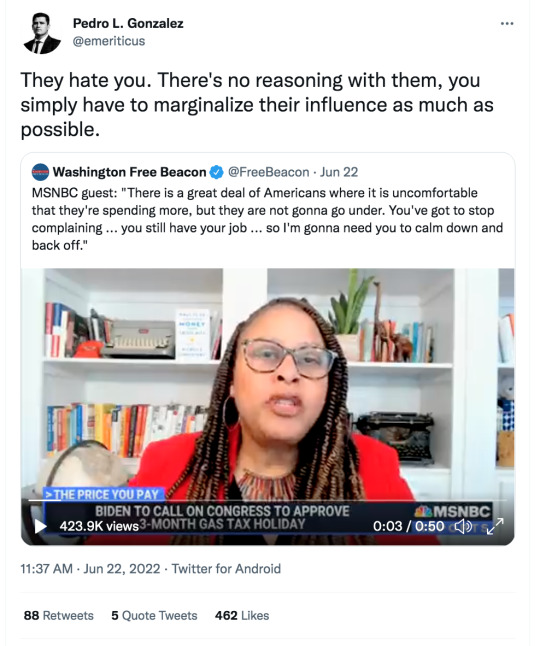
(link)
0 notes
Text



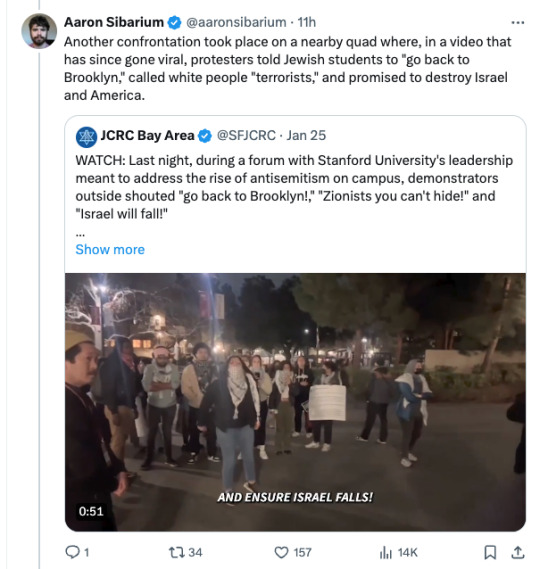
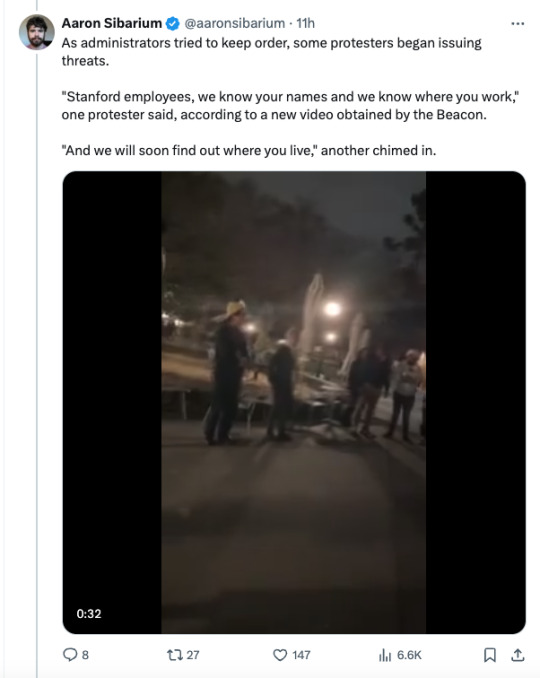

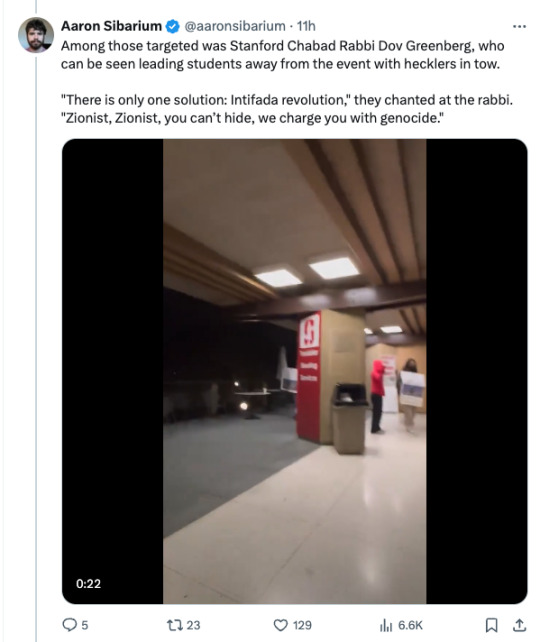

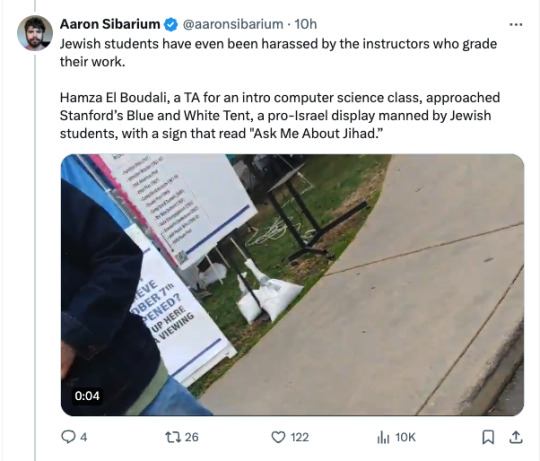
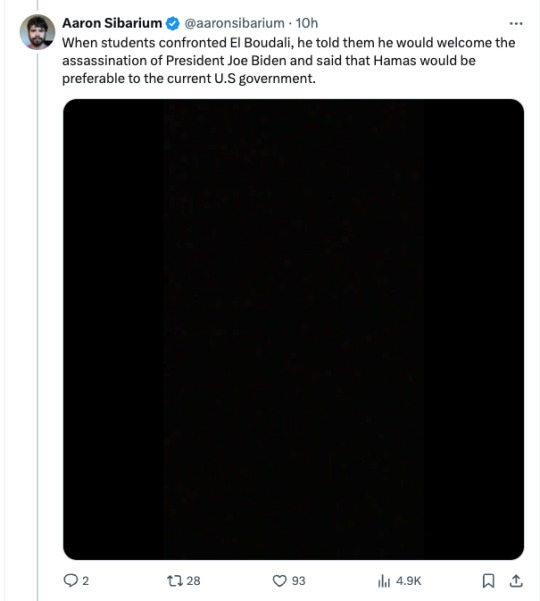

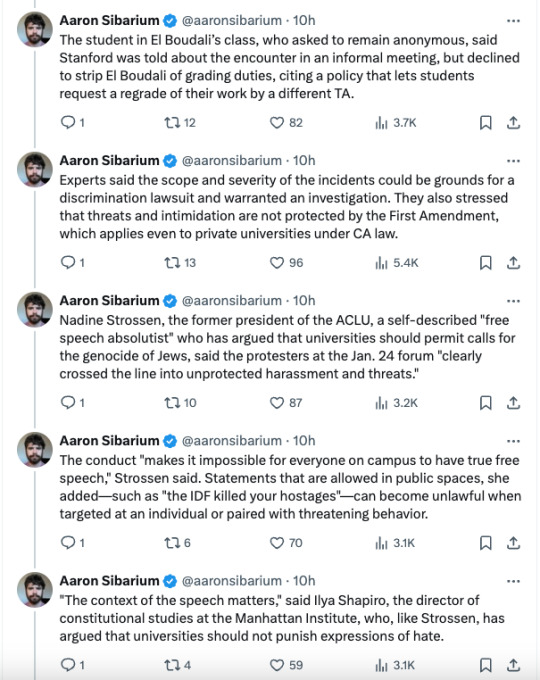

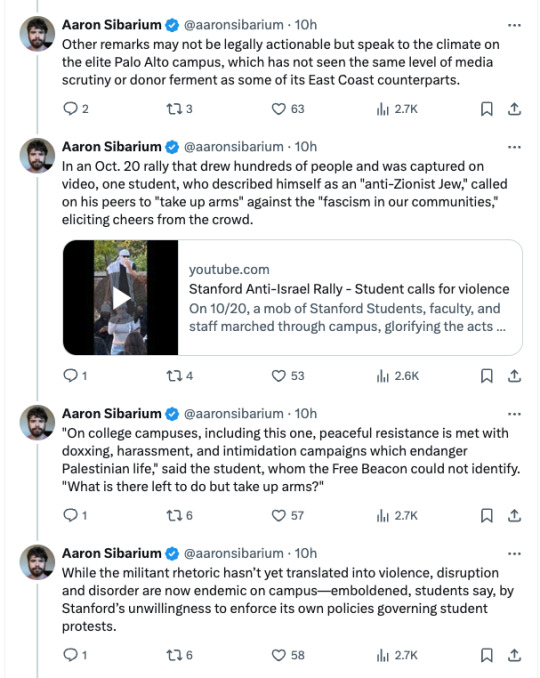

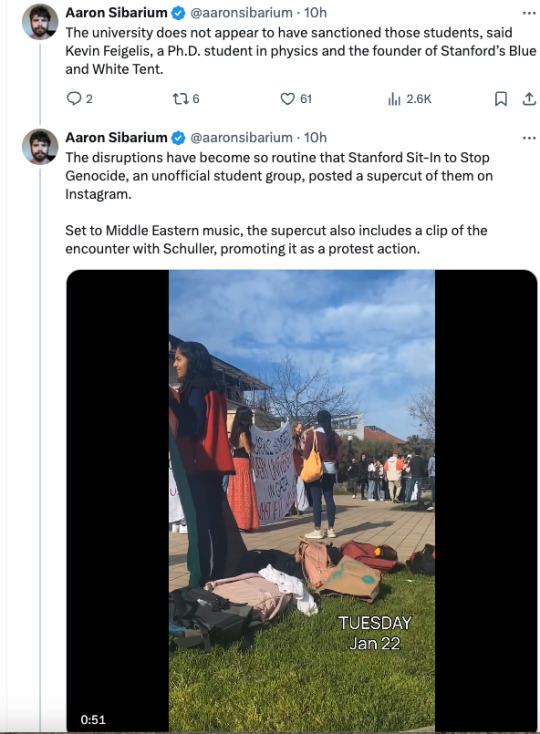


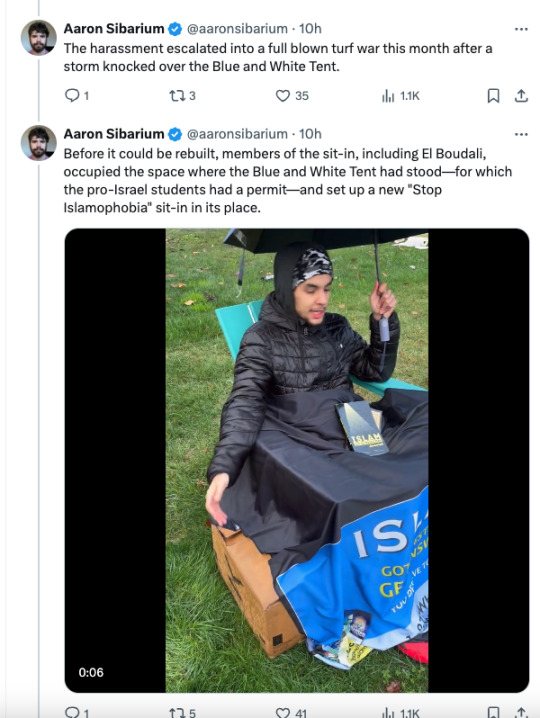
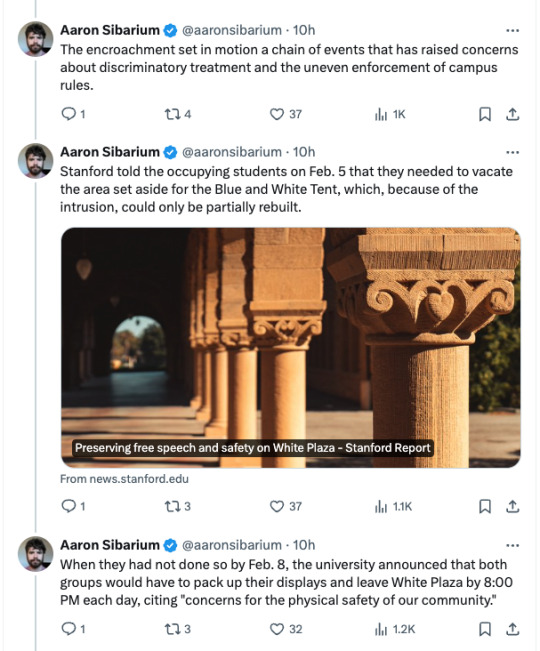
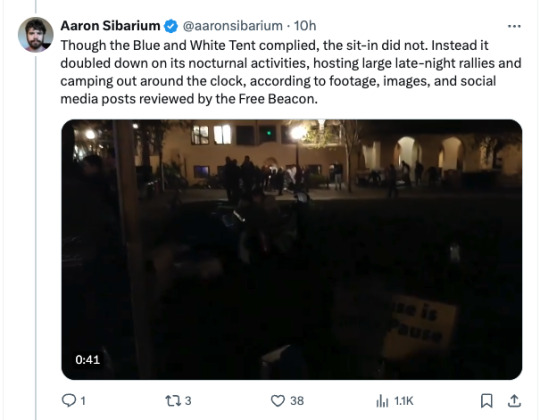
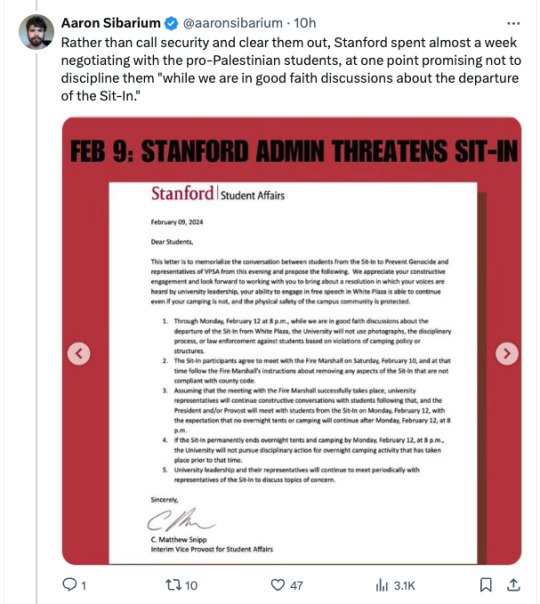


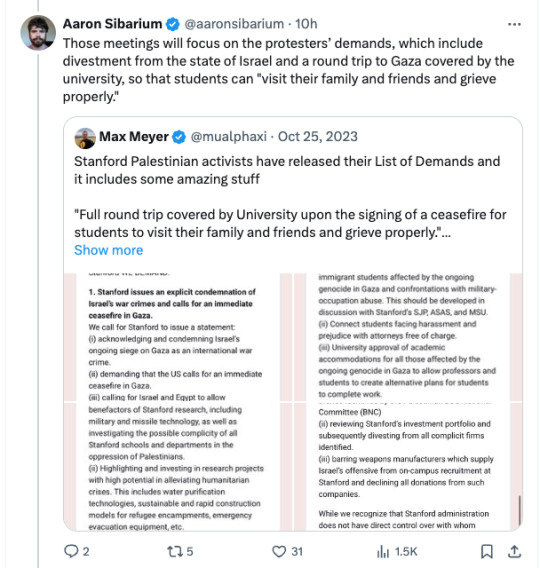
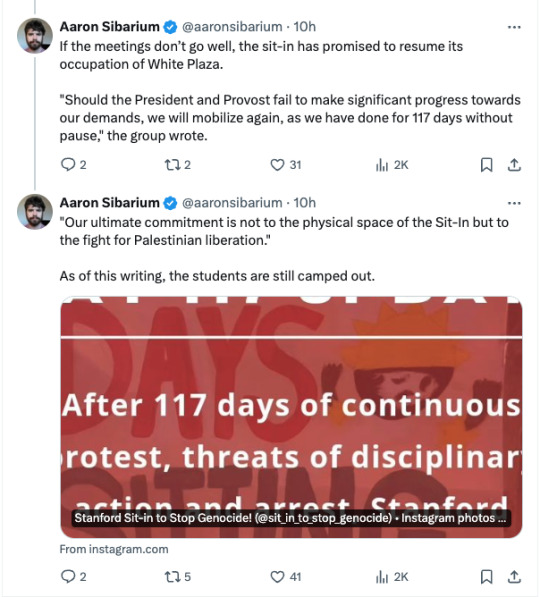
Source
The article this X thread was created from is at the Washington Free Beacon.
#stanford university#the mob#antisemitism#jewish students#camping on campus#hamza el boudali#ari kelman#david schuller#harassment
376 notes
·
View notes
Text
Far-right politicians with an explicit history of antisemitism, such as Marine Le Pen, have been praised in recent months for their support of Israel and virulently anti-Muslim sentiment. On November 15th, Elon Musk tweeted out his support for the “great replacement theory”—the idea that Jewish people are engineering white genocide—leading to condemnations from the White House, and from X advertisers such as Apple and Disney. On November 17th, Musk announced an X ban on pro-Palestinian phrases like “from the river to the sea,” which he characterized as antisemitic hate speech. Minutes after the announcement, Jonathan Greenblatt, Director of the ADL, logged on to express his gratitude to Musk, writing: “I appreciate this leadership in fighting hate.” In a recent article for the far-right Washington Free Beacon, provocatively titled “What Makes Hamas Worse Than the Nazis,” bestselling British historian Andrew Roberts mounts a rousing defense of Nazism, ostensibly in the name of condemning antisemitism. Although the Nazi government began systematically murdering disabled and queer people even before the start of the war, Roberts insists that their operations were incidentally rather than deliberately sadistic, and that the majority of German people during the war opposed mass murder. If his aim is clearly to demonize the cause of Palestinian liberation as a whole, his exoneration of European fascism as “just following orders” is no less central of a claim. By conflating “antisemitism,” “genocide,” and even “Nazism” with Palestine, Hamas, and Islam as a whole, this kind of historical revisionism works to redeem the European far-right as inherently civilized even in its most barbaric actions.
Any attempt to adopt a more humanist perspective, to take a longer or wider lens on the annihilation of Europe’s Jewish communities, or to relate their struggles and suffering to the struggles and suffering of others would appear to betray the ethos of post-Holocaust Jewishness. Aimé Césaire and Frantz Fanon both famously argued that the extreme state violence of fascism and the Holocaust was an imperialist backlash, the excesses of colonial violence returning home, only shocking in that it took place on European soil. In his introduction to Modernity and the Holocaust, Zygmunt Bauman describes the insistence on the uniqueness of the Holocaust as a form of historical decontextualization. Or, more plainly, as a refusal to engage in collective self-reflection. “One way is to present the Holocaust as something that happened to the Jews; as an event in Jewish history. This makes the Holocaust unique, comfortably uncharacteristic and sociologically inconsequential.” Bauman asserts that the underlying rationale for this circular logic, by which abstracted antisemitism is both sole cause and sole effect of the Holocaust, is collective exoneration. It works as a shield for modern European civilization, capable of outliving such atrocities.
[...]
It is not incidental then that, in line with right-wing ideological programs, the mainstream current of Holocaust narratives primarily encourage identification with the perpetrators rather than with the victims. They are propelled by the cause of personal enlightenment, encouraging the reader to look within for evil and to root it out rather than ever looking outward at the world surrounding them. Evil, this version of history would have you believe, is a personal problem and not a systemic one. It can crystallize through a mysterious process into mass evil, a spiritual rot. This gives it a kind of mystical aspect. It is easier from this perspective to believe in the innate evil of some, in the innate goodness of others. This moral binary is frequently mobilized in defense of violence and injustice. In a deleted tweet, Netanyahu called Israel’s ongoing genocidal attack on Gaza “a war between the children of light and the children of darkness.” In a December 2023 speech, Joe Biden reaffirmed his condemnation of Hamas, which he implicitly collapsed into a condemnation of Palestinians as a whole, calling them “a brutal, ugly, inhumane people, and they have to be eliminated.” Both were invoking this moral binary, the deformed vocabulary of white supremacy and colonialism. For if the world is made up of people who are “good” and “bad,” “civilized” and “barbaric,” rather than of societies shaped by ideologies, then it is possible to characterize an entire group of people as evil, to dehumanize them, to declare them guilty all the way down to their newborn babies, to justify their mass murder.
In broader terms, this is a totalizing story about history; one in which the European perpetrators of wars of aggression, ethnic cleansing, and genocide, can redeem themselves by retelling their crimes but this time as witnesses to horror rather than as active participants. They can atone and wash away the sin of what they have done by giving it a narrative structure with an ending and a moral lesson, one in which the Holocaust finds its silver lining in the creation of the state of Israel, one in which Europe becomes civilized again, one in which blame is shifted from Germany to Palestine, and from fascists to anti-fascists.
87 notes
·
View notes
Text
by Adam Kredo
A Washington, D.C., rabbi is suing two pro-Palestinian agitators for assaulting him last month during a prayer session outside of the Israeli embassy, according to a copy of the complaint obtained by the Washington Free Beacon.
Rabbi Shmuel Herzfeld, an Orthodox rabbinic leader at the Yeshivas Elimelech Jewish school, says he was hosting a small prayer group outside the Israeli embassy in late March when two pro-Palestinian protesters began blaring sirens and bullhorns, interrupting the session and ultimately causing damage to Herzfeld’s hearing.
Herzfeld is charging the two protesters—named as Hazami Barmada and Atafeh Rokhvand—with "assault, battery, outrage, and other violations" as a result of their actions. Herzfeld claims he "suffered acute acoustic trauma and other harm" following the incident, which the filing dubs a hate crime. Both Barmada and Rokhvand are identified in the suit as the leaders of ongoing demonstrations outside Israel’s Washington embassy and in front of Secretary of State Antony Blinken’s private residence.
The case comes amid a flurry of clashes between pro-Israel and pro-Palestinian demonstrators across the country, where violence has repeatedly broken out. Herzfeld’s case highlights the aggressive tactics being used by some protesters as they seek to disrupt pro-Israel gatherings and foment unrest.
Herzfeld and his group were praying for the Israeli hostages still being held by Hamas, as well as for the innocent Gaza Strip residents caught in the violence, when "they were surrounded" by the alleged "pro-Hamas protesters" who were sporting "earplugs or sound-canceling headphones—and who were already encamped in front of the embassy," according to the suit.
The sound equipment deployed by the pro-Palestinian demonstrators was "intended to prevent any speech or other support for Israel," the suit charges. When the group continued its prayer session, the protesters allegedly "increased the volume of the siren-like sound being generated by the bullhorns, sirens and loudspeakers to levels that are far in excess of those allowed by District of Columbia law."
Security staff from the Israeli embassy ultimately had to bring Herzfeld and his group into the building to prevent the situation from spiraling further out of control.
"The effort to drown out Rabbi Herzfeld’s prayers persisted for several minutes, without abatement," the suit states. "As Rabbi Herzfeld and his group tried to pray, the sound level increased as Rabbi Herzfeld tried to make himself heard over the din."
The rabbi is seeking an unspecified amount in damages and a court injunction to stop the two protest leaders "from harassing, obstructing, or interfering with Rabbi Herzfeld’s activities, including his leading of prayer, protests, or other lawful activities."
45 notes
·
View notes
Text
In its analysis of Comscore data, TheRighting found significant audience erosion at every news website except one it monitored in the four-year period from 2020 to 2024. The three largest news websites had the smallest audience declines: CNN (-20%), The New York Times (-22%), Fox News (-24%). Almost every right wing news website suffered audience decreases of at least 50%, with three outlets – Breitbart, Townhall and the Washington Free Beacon – each posting drops of 87%. Only Newsmax, among all the news websites surveyed by TheRighting, generated an audience increase (+37%) from January 2020 to January 2024.
[…]
“It’s important to note that 2020 was a banner year for traffic because it was the most consequential year in American history this century. Major 2020 events included the pandemic, the civil unrest following the death of George Floyd, and the contentious battle for the presidency between Donald Trump and Joe Biden. Unless some unfathomable incident occurs, it’s hard to see how 2024 will come close to producing the same audience levels for most news brands from four years ago.”
13 notes
·
View notes
Text
By: Aaron Sibarium
Published: May 9, 2024
The school has declined to investigate faculty members for celebrating terrorism and calling for the destruction of Israel.
Yale University spent more than a year investigating a Jewish professor for six words of an op-ed he published in a pro-Israel newspaper, raising questions about the school’s approach to anti-Semitism and free speech as the campus continues to cope with the fallout of the Israel-Hamas war.
Evan Morris, a professor of biomedical engineering at Yale School of Medicine, penned the 2022 op-ed in the Algemeiner along with 14 other professors. They described a pattern of anti-Semitism in the Yale Postdoctoral Association, a group that runs social and academic events for researchers.
The authors listed several examples of anti-Semitic and anti-Israel bias. In one aside, they claimed that a researcher at the medical school, Azmi Ahmad, had "blocked an Israeli postdoc from speaking" at an October 2021 screening of a film about the Israeli-Palestinian conflict.
Those six words triggered a marathon investigation by the medical school’s Office of Academic and Professional Development—a body responsible for disciplining professors for "unprofessional behavior"—that began in February 2023, over six months after the op-ed was published, and concluded in April 2024.
The office told Morris that it had been "tasked with assessing the accuracy" of the six-word statement, according to an email reviewed by the Washington Free Beacon. It did not tell him who filed the complaint, what policy he had allegedly violated, or what the consequences of that violation could be but said the review was likely to be completed by June 2023.
Instead, it dragged on without updates for over a year, according to Morris and emails reviewed by the Free Beacon. During that time—including in the post-October 7 era—Yale repeatedly declined to sanction students and professors for vicious anti-Israel speech, citing the importance of free expression.
The university took no action against Zareena Grewal, a professor of ethnicity, race, and migration, after she called October 7 "an extraordinary day" and stated that "settlers are not civilians." Nor did it investigate a Yale Law School student group that called for "armed struggle" against Israel and said that Hamas should be delisted as a terrorist organization.
"Yale is committed to freedom of expression," a university spokesperson, Karen Peart, said of Grewal’s remarks. "The comments posted on Professor Grewal’s personal accounts represent her own views."
By contrast, Morris earned a rebuke from the head of the university’s professional development office, Robert Rohrbaugh, who on April 11 shared the findings of the school’s investigation in an email.
"We were not able to substantiate the allegation that one postdoc was blocked from speaking by the postdoc identified in your article," Rohrbaugh said. "Our request to you for the future is that when attributing conduct to a named university community member, particularly a trainee, you be as diligent as possible to be sure information presented is accurate."
The protracted and seemingly selective probe has outraged Jewish faculty members, who say that the finger-wagging at Morris—and the decision to engage in it amid a nationwide surge in campus anti-Semitism—is tone deaf to say the least.
"Apparently, you have learned nothing from the last 6 months of rampant, unremitting and sometimes destructive and threatening anti-Semitism on campus," Morris wrote to Rohrbaugh. "Yale spends its resources and 2 years investigating 6 words in an OpEd by its faculty but fails to discipline professors who call for the annihilation of the Jewish people."
Pnina Weiss, a pediatrician at Yale Medical School who did not sign the 2022 op-ed but reviewed the correspondence between Morris and Rohrbaugh, said the investigation was "hard to reconcile" with Yale’s stated commitment to free speech.
"The administration has defended the right of professors like Zareena Grewal to post on social media—celebrations of the rape, kidnapping, and cold-blooded murder of Israelis on October 7," she told the Free Beacon. "Yet when a group of 15 Jewish faculty write an op-ed about anti-Semitism and the suppression of an Israeli postdoc’s speech, the faculty are ‘investigated’ and reprimanded for misusing the word ‘block.’"
Double standards, Weiss continued, "are the cornerstone of anti-Semitism."
Aside from the verbal slap on the wrist, Yale has yet to formally sanction Morris, and the school declined to comment on its decision to single him out for investigation or say whether any other discipline remains on the table. In a statement on Rohrbaugh’s behalf, the university’s communications office said that the medical school was "not aware of any disciplinary action" against Morris, suggesting the rebuke in April was unofficial.
"Yale University and the School of Medicine vigorously reject anti-Semitism," the communications office said. "For example, the School of Medicine provides support for educational events on anti-Semitism organized by Dr. Morris through a grant from the Academic Engagement Network."
Ahmad, the postdoc named in the 2022 op-ed, did not respond to a request for comment.
The blowback to the investigation comes as Yale president Peter Salovey is preparing to submit testimony to Congress about the school’s handling of anti-Semitism, which, while less heavily criticized than Columbia’s, has generated its share of bad press.
Administrators stood by for days as protesters occupied a university plaza, defaced a World War II memorial, and harassed Jewish students who attempted to film the chaos, culminating in an April 20 confrontation that injured one student and prompted a sheepish apology from protest organizers. Additional encampments and occupations—one of which shut down a major intersection—sprung up sporadically in the following weeks.
Those disruptions followed a string of quieter scandals at the Ivy League university, where the campus aftershocks of Hamas’s assault fueled charges of hypocrisy and double standards. At Yale Law School, for example, the Schell Center for International Human Rights—which in 2022 spon.sored a talk on Israeli "apartheid"—resisted calls to host an event about Oct. 7, telling one Jewish student that the situation was "complex."
"What kind of 'Center for International Human Rights' would refuse to host an event condemning the largest pogrom since the Holocaust," Jewish students at the law school asked in an open letter. "Does the Schell Center not think that Israelis are entitled to human rights, too? Or is it perhaps because they were Jewish?"
The center only agreed to host an event after weeks of pressure, including from Jewish alumni. In the interim, several students posted defenses of the Oct. 7 massacre on a law school-wide listserv, which soon devolved into ad hominem back-and-forths.
"Expecting Palestinians to peacefully respond to unspeakable war crimes and illegal collective punishment they've experienced at the hands of Israel is laughable," Iesha Phillips, the lead editor of the Yale Journal of Law & Liberation, responded to one Jewish student. "Too many lives have been lost over the past few decades. We shouldn't only start to care because it's now affecting Jewish folks."
The law school’s hands-off approach to those posts contrasted sharply with its response to Trent Colbert, a second-year law student, when he invited students to his "traphouse" in 2021. Within hours of sending the invitation, Colbert was hauled into a meeting with school administrators who demanded he sign a pre-drafted apology and hinted he could face discipline—including consequences with the bar—if he refused.
They would later claim the encounter had been misconstrued. "We would never get on our letterhead and write anything to the bar about you," Yaseen Eldik, then the law school’s diversity director, told Colbert a month after their first meeting. "You may have been confused."
The backpedaling foreshadowed the tactics Yale used with Morris: launch an investigation, raise the possibility of discipline, then suggest after the fact that the probe’s target overreacted and imagined the threat.
"My prior communication did not question the right of faculty authors to voice their opinion or ask you to change your opinion," Rohrbaugh wrote in response to Morris’s message criticizing the investigation. "Although we found that one of the statements made about a trainee in a national media outlet could not be substantiated, my communication did not raise the topic of apology."
Rohrbaugh also chided Morris for declining to be interviewed as part of the investigation, after the school repeatedly refused to tell him what rule he’d been accused of breaking or who made the accusation, according to emails reviewed by the Free Beacon.
"Have I violated a Yale morality code?" Morris had asked Rohrbaugh in May 2023. "If so, where can I find it?"
He never heard back.
==
Never forget: the process is the punishment.
#Aaron Sibarium#Yale University#antisemitism#israel#hypocrisy#pro hamas#hamas supporters#free speech#freedom of speech#academic freedom#higher education#corruption of education#hamas terrorism#hamas#campus protests#student protests#protester violence#student violence#religion is a mental illness
9 notes
·
View notes
Text
Boston University’s Center for Antiracist Research, headed by critical race theory activist Ibram X. Kendi, revealed last week that it was laying off about 40% of its staff as part of organization restructuring. About 15 to 20 of its approximately 45 employees were let go. Testimonies from former employees have exposed alleged mismanagement of Kendi’s center, which in turn has exposed the fraudulence and fragility of the diversity, equity, and inclusion complex.
Disgruntled former employees have accused Kendi of mishandling grant funding, failing to complete major projects, and fostering an exploitative company culture in which he ruled with an iron fist yet was routinely missing in action. The center has raked in $43 million since its inception, according to 2021 budget records obtained by the Daily Free Press. It received corporate support from Peloton, Deloitte, Stop & Shop, TJX Companies, and Deckers Outdoor Corporation, according to a 2020–2021 donor report. Only six weeks after its launch, then-CEO of Twitter Jack Dorsey gifted $10 million without conditions.
“Your $10M donation, with no strings attached, gives us the resources and flexibility to greatly expand our antiracist work,” Kendi posted at the time. “The endowment is vital, as we build our new Center.”
Despite the investments, the center did not deliver on some key priorities, such as the much-hyped Racial Data Tracker that would document racial inequities in all sectors of society to finally root out racism.
“I don’t know where the money is,” Saida Grundy, a BU professor who worked at the center from fall 2020 to spring 2021, told the Boston Globe after the staff cuts.
Multiple other BU professors served as faculty leads on various projects at the center. Professor Sanaz Mobasseri of BU’s business school led the Antiracist Tech Initiative, professor Kaylene Stevens of BU’s education school led the “Designing Antiracist Curricula” team, and political science professor Spencer Piston led the Policy Office, for example.
In December 2021, Grundy emailed BU provost Jean Morrison that the organization had been showing a “pattern of amassing grants without any commitment to producing the research obligated” by them.
Like its umbrella idea DEI, “antiracism” actually translates to, well, nothing of note. Serial academics such as Kendi have built careers around racial fearmongering, even inventing new disciplines to study racism and its early-stage minutiae “microaggressions” and “implicit bias.” Rather than confront actual crimes of racism, these courses seek to aggressively manufacture racist intent.
Despite all this bureaucracy, academic DEI projects have unclear aims and products. Kendi’s center published just two research papers since its founding, the Washington Free Beacon reported. A January paper, "Association of Neighborhood Racial and Ethnic Composition and Historical Redlining With Build Environment Indicators Derived From Street View Images,” found that predominantly black neighborhoods had more dilapidated buildings than white neighborhoods. The center released a report from its "Antibigotry Convening” from fall 2021 and winter 2022 that included many intersectionality themes such as “Ageism,” "Anti-fat Bigotry,” and “Transphobia,” further confusing its purpose.
Rachel Lapal Cavallario, spokeswoman for Kendi’s center, told the Boston Globe Wednesday that BU had “received some complaints from individuals questioning whether the center was following its funding guidelines. We are currently looking into those complaints.”
However, the center rejects the “characterization of it not having produced important work insofar as antiracism is concerned,” she said.
To raise Grundy’s question again, where did the money go? Echoing that sentiment, BU has launched an “inquiry” into the center amid the scandal, the Daily Free Press said.
The situation is reminiscent of the lawsuits against Black Lives Matter, another embattled racial justice organization. In 2023, Black Lives Matter reported a $9 million deficit for 2022 after raising $90 million in 2020. Only 33% of that massive sum went to charitable activism, federal filings showed, as a significant chunk was squandered on the leaders’ mansions, personal expenses, and favors for friends. Both Kendi’s center and BLM followed a similar model: drum up rumors of racism, prescribe DEI, create an apparatus, lure in donors, get paid.
The racial grievance business welcomes little accountability — or accounting, for that matter — which explains why it’s found a home in academia. Many colleges, such as Boston University, or my alma mater Boston College down the road, charge their students exorbitant tuition for useless degrees and boatloads of debt. Tenured professors collect big paychecks while hawking critical race theory, turning students into activists instead of real scholars.
Despite its self-destructive tendencies, the DEI racket continues to spread throughout academia. Some colleges are trying to meet demand for so-called DEI experts by creating a corresponding major, USA Today claimed. At least six colleges across the country offer DEI degree programs or will in the future, according to the publication’s analysis. Tufts University and the University of Pennsylvania even have DEI graduate programs.
Some universities have also woven DEI into their academic missions. Duke University in 2020 launched a Racial Equity Advisory Council, composed of four subcommittees including faculty members and students, which will propose “measures to assess and foster racial equity” to the university’s leadership. Every year since fall 2020, the Duke Endowment has sponsored professors with seed grants to pursue research proposals related to race as part of the school’s anti-racism mission. That’s more money down the drain.
DEI in America’s prestigious colleges contributes nothing, wastes money, and fuels a bubble of empty courses, professions, and promises. But if the shakeout at Kendi’s BU center is any clue, it might be starting to pop.
23 notes
·
View notes
Link
Transportation Secretary Pete Buttigieg might have to start biking to work again like a total nerd. That's because the Mexican-made electric SUV he purchased last year for his security detail is being recalled due to a safety defect that "could result in a loss of power [while driving], which could cause a crash," according to Consumer Reports.
Ford announced Tuesday that it was instructing car dealers to stop selling the Mustang Mach-E in response to the safety concern affecting nearly 49,000 of the 100,000 vehicles manufactured at the automaker's Cuautitlan plant in Mexico between 2020 and 2022. The company decided to make the cars in Mexico because it was a lot cheaper than hiring American workers to do it in this country.
The development could undermine Buttigieg's controversial suggestion that hardworking Americans should stop complaining about record gas prices and buy expensive electric cars so that they'll "never have to worry about gas prices again." The Mach-E has a starting price of $43,895, although most new models for sale in the Washington, D.C., area are listed in the $60,000 to $80,000 price range.
#Washington Free Beacon#Pete Buttigieg#Biden administration#Ford Motor Company#electric cars#Mexico#Department of Transportation#cars#recalls#Andrew Stiles#Mustang Mach-E#Mustangs
6 notes
·
View notes
Text
A Portland, Oregon, school district recently issued new “equitable grading” practices that will require teachers to accept late work without penalty and refrain from giving students zeros, even if they are caught cheating, according to documents obtained by the Washington Free Beacon.
A new district handout titled “Portland Public Schools Equitable Grading Practices Summary” highlights the district’s “rationale” for implementing a so-called “equitable” approach to grading students’ class performance.
“Historical data shows that there are racial disparities in our pass/fail rate in multiple subjects in both middle grades and high school,” the district’s handout stated. “During the pandemic we adjusted our grading to accommodate for some of the inequities in access to curriculum and instruction. This caused many teachers to begin the journey towards equitable grading but has led to a mosaic of grading practices across schools and across the district that is confusing to students and families. We need to organize and consolidate our efforts towards common policies to more consistently and better support students and families with equitable grading.”
23 notes
·
View notes
Link
So say you’re a movie studio executive desperately looking through your backlog of titles for some "intellectual property" you already own that you can exploit. You discover that you possess the rights to the farcical Naked Gun series. And it comes to you: You could redo The Naked Gun, only… serious!
Watch as a young Frank Drebin breaks up a drug ring as he learns he has to rely on his partners and not go it alone! Yeah… nah.
Well, something almost exactly like this happened to the people at Pixar and Disney a few years ago when they looked at their IP and had the blinding flash that they could build a new animated action franchise based on an iconic character from the very first Pixar film: Toy Story’s Buzz Lightyear.
…
Lightyear opened on Friday and performed disappointingly. You’re going to read a lot about why that happened. Let’s go through all the explanations and discredit each of them one by one.
First: It’s because all of Pixar’s movies since the pandemic began moved to the Disney Plus streaming service and therefore the Pixar audience has been trained to stop paying for its fare. This is ridiculous, and I’ll tell you why. Disney Plus has been a salvation for Pixar these past two years because the movies it’s made since 2019 would likely have done badly at the box office regardless. Even the best of Pixar’s pandemic releases, the beautiful Soul, was simply too downbeat and melancholy—it’s about a midlife crisis and what it means to be or feel like you are a career failure. Luca, about a boy mermaid in 1950s Italy, was so wan and undercooked it’s surprising they didn’t kill it off after the first draft (Pixar movies are rare in Hollywood because they go through drafts almost in the same way novels do). And Turning Red, about a girl who turns into a rage monster due to her menarche, was, notwithstanding its 93 percent fresh rating on Rotten Tomatoes, one of the most sheerly dislikable films of the past 20 years.
…
Second: It’s because Disney-Pixar’s fixation on jamming gay content into its fare led to a same-sex couple kissing on screen in Lightyear, which cost it a conservative audience. The lesbian couple in Lightyear is so totally extraneous to the plot that the detail could only have been made a part of the movie to make a political or ideological point in a movie that is really (unlike Soul) aimed at kids. So anyone who says Disney isn’t propagandizing in the culture war is either disingenuous or stupid. That said, the whole thing lasts a second and you could easily miss it, and if the movie were fantastic, a lot of people would roll their eyes and move on.
Third: Tim Allen was replaced as the voice of Buzz Lightyear by Chris Evans, and fans are furious. Please. Who cares. Really? Although one possible aspect of this change is certain to stoke Fox and Newsmax for weeks to come: Tim Allen is a Trump-friendly conservative, while Evans (once referred to in the Washington Post as the "actor-turned-activist") is Mr. Wokey Von Wokenstein.
Nah, nah, nah. Here’s why.
…
Now comes this dull, arid, uninteresting bollix of a vehicle in which Buzz is no longer a toy but rather an actual Space Ranger. And the whole of Lightyear turns on a catastrophic mistake he makes out of vaingloriousness—he strands himself and dozens of fellow shipmates by trying a flying maneuver that destroys his craft and maroons them on a far-away planet. This happens in the first 10 minutes, which raises the question: Why should we care what happens to this Buzz? He's a jerk.
In his book Adventures in the Screen Trade, William Goldman tells the story of his sure-to-be-a-blockbuster 1975 movie The Great Waldo Pepper, in which he reteams with director George Roy Hill and Robert Redford (the three had made Butch Cassidy and the Sundance Kid together before Hill and Redford went off to do The Sting). The movie’s plot hinges on an accident, when the 1920s pilot Waldo Pepper has his girlfriend (the young Susan Sarandon) doing a stunt walk on the wing of his plane. He screws up and she falls off and dies.
When they all saw the movie with an audience for the first time, Goldman reports, they knew they had made a disastrous error. Nobody wanted to see Robert Redford kill Susan Sarandon, even by mistake. Even if the rest of the movie showed Waldo redeeming himself, the audience was lost, the word of mouth was going to be terrible. There was no way to fix this. And that’s why you’ve probably never heard of The Great Waldo Pepper.
Lightyear’s plot mistake isn’t even the worst thing about it. The worst thing about it is that it’s not funny, it’s not interesting, and if the character was named Phil Shmedlap, this thing wouldn’t even exist. This fundamental misunderstanding of how to use existing "intellectual property"—which is not to redefine and undermine the very thing you’re trying to evoke fondly—just never seems to have occurred to anyone at Pixar or Disney.
0 notes
Text
Jessica Costescu
A Cornell University instructor who once said Israelis should "rot in the deepest darkest pits of hell" canceled her first class of the semester in solidarity with a "Global Strike for Palestine," an email obtained by the Washington Free Beacon shows.
Alyiah Gonzales, a Ph.D. student at Cornell who teaches an English class on "race, writing, and power," emailed her students Monday to say she was "canceling class in solidarity with collective calls for a Global Strike for Palestine," according to a screenshot of the message. Gonzales in her email said she "mourn[s] the fact that all universities in Gaza have been destroyed or demolished by Israeli military forces." In lieu of class, she asked her students to write an essay on "the relationship between writing, power, and systems of oppression."

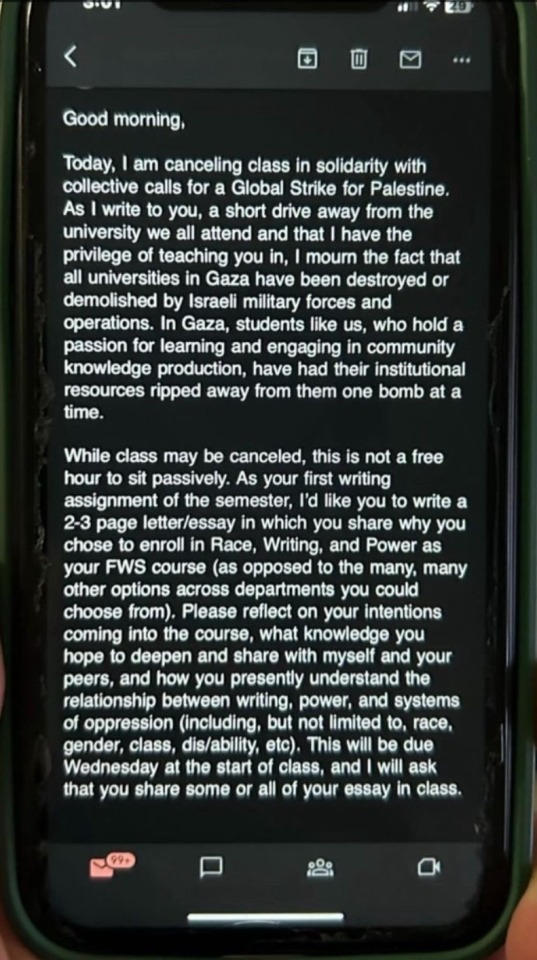
Gonzales's message comes as Cornell and other Ivy League institutions grapple with a federal investigation into anti-Semitic incidents on campus. In late October, a Cornell junior was arrested and charged with posting anti-Semitic threats online—in one message, the student allegedly said he would "bring an assault rifle to campus and shoot all you pig Jews." Cornell history professor Russell Rickford, meanwhile, praised Hamas's Oct. 7 attack on Israel during a campus rally, calling it "exhilarating" and "energizing."
52 notes
·
View notes
Text
Aaron Sibarium
It was October 10, three days after Hamas had murdered 1,200 Israelis and abducted hundreds more, and Jewish students at Middlebury College were trying to organize a vigil for the victims. They reached out to Middlebury’s dean of students, Derek Doucet, with a draft poster promoting the event, which they invited administrators at the elite liberal arts school to attend.
"Stand in Solidarity With the Jewish People," the poster read. "This will be an opportunity to honor the innocent lives lost in the tragic events that have struck Israel in the past days."
It didn’t go over well.
In an email to students reviewed by the Washington Free Beacon, Doucet, who has oversight of student activities, pushed to rename the vigil and strip it of references to Judaism so as to make it "as inclusive as possible."
"Some suggestions that might help are stating that this gathering is to honor ‘all the innocent lives lost,’" Doucet wrote, and including a reference to the "tragedies that have struck Israel and Gaza." He added that calls for solidarity with Jews could trigger "unhelpful reactions."
"I recognize and deeply respect that there has to be a place for purely Jewish grief and sorrow," Doucet said, "and yet I wonder if … such a public gathering in such a charged moment might be more inclusive with edits such as these."
The need to include all groups—in a vigil mourning the losses of one—was selective and short-lived. Less than a month later, Doucet’s office approved a "Vigil for Palestine," hosted by the Muslim Students Association, that began with an Islamic prayer and featured remarks from the school’s vice president of equity and inclusion, Khuram Hussain, who did not attend the Jewish vigil.
"Standing in solidarity," the Muslim student group wrote in an Instagram post promoting the event. "Together, we honor Palestine."
The divergent reaction to the two events is one of the most shocking examples of discrimination outlined in a federal civil rights complaint against Middlebury, one of the top liberal arts colleges in the country. Filed last month by the StandWithUs Center for Legal Justice, a pro-Israel nonprofit that has sued other elite schools over anti-Semitism, the complaint alleges that Middlebury created a hostile environment for its Jewish students by ignoring and at times impeding their efforts to combat campus anti-Semitism.
-
Middlebury funds and recognizes six Christian clubs on campus, for example, along with both the Muslim Students Association and Students for Justice in Palestine. But it has refused to recognize Chabad, an orthodox campus organization with chapters across the country, on the grounds that Jewish students already have access to Hillel, the only space at Middlebury with a Kosher kitchen.
"The funding request for food replicates programming already funded and offered by Hillel for Shabbat dinners," Middlebury’s student activities office wrote in a February email rejecting Chabad’s bid for recognition. It was at least the second time since 2018 that the school has denied an application from Chabad.
"Middlebury believes it has legitimate grounds to deny a Jewish club’s recognition simply on the grounds that one Jewish group is more than enough for the campus," the complaint reads. "It appears that Chabad’s rejection was at least in part based on a disturbing reluctance by Middlebury to provide kosher food options to its Jewish students."
The school also resisted calls for a police presence at the Jewish vigil in October, citing concerns that the officers could upset students, and asked the organizers of the event not to display Israeli flags, according to meetings described in the complaint.
The Palestinian vigil appears to have faced fewer hurdles. Not only did Middlebury station a police car outside the event, according to a report in the school’s student newspaper, it offered up Middlebury Chapel, one of the largest event spaces on campus, to the Muslim group after interest in the vigil surged. The chapel was not made available for the Jewish vigil, which was held outside, even though it drew a larger crowd than the pro-Palestinian event.
81 notes
·
View notes
Text
By: Aaron Sibarium
Published: Dec 11, 2023
Harvard University president Claudine Gay plagiarized numerous academics over the course of her academic career, at times airlifting entire paragraphs and claiming them as her own work, according to reviews by several scholars.
In four papers published between 1993 and 2017, including her doctoral dissertation, Gay, a political scientist, paraphrased or quoted nearly 20 authors—including two of her colleagues in Harvard University’s department of government—without proper attribution, according to a Washington Free Beacon analysis. Other examples of possible plagiarism, all from Gay’s dissertation, were publicized Sunday by the Manhattan Institute’s Christopher Rufo and Karlstack’s Chris Brunet.
The Free Beacon worked with nearly a dozen scholars to analyze 29 potential cases of plagiarism. Most of them said that Gay had violated a core principle of academic integrity as well as Harvard’s own anti-plagiarism policies, which state that "it's not enough to change a few words here and there."
Rather, scholars are expected to cite the sources of their work, including when paraphrasing, and to use quotation marks when quoting directly from others. But in at least 10 instances, Gay lifted full sentences—even entire paragraphs—with just a word or two tweaked.
In her 1997 thesis, for example, she borrowed a full paragraph from a paper by the scholars Bradley Palmquist, then a political science professor at Harvard, and Stephen Voss, one of Gay’s classmates in her Ph.D. program at Harvard, while making only a couple alterations, including changing their "decrease" to "increase" because she was studying a different set of data.
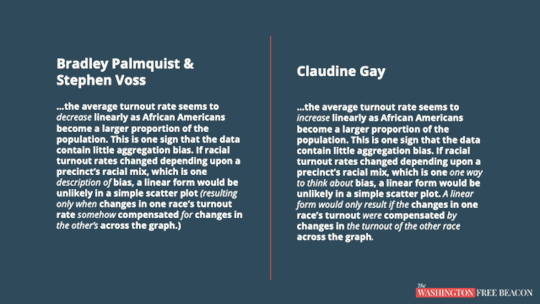
The four papers that include plagiarized material comprise a sizable portion of Gay’s academic work. Gay, who is Harvard's 30th president, has authored just 11 peer-reviewed articles.
"If this were a stand-alone instance, it would be reprehensible but perhaps excused as the blunder of someone working hastily," said Peter Wood, a former associate provost of Boston University, where he helped investigate several cases of suspected plagiarism. "But that excuse vanishes as the examples multiply," said Wood, who now serves as the director of the National Association of Scholars.
Some of the most clear-cut cases come in Gay’s 1997 dissertation, "Taking Charge: Black Electoral Success and the Redefinition of American Politics," which copied two paragraphs almost verbatim from Palmquist and Voss.
The paragraphs—from a paper Palmquist and Voss had presented a year earlier, in 1996—do not appear in quotation marks. One is unmodified but for a handful of words, and Gay does not cite Palmquist or Voss anywhere in her dissertation.

"This is definitely plagiarism," said Lee Jussim, a social psychologist at Rutgers University, who reviewed 10 side-by-side comparisons provided by the Free Beacon, including the paragraphs from Gay’s dissertation, which received a prize from Harvard for "exceptional merit."
"The longer passages are the most egregious," he added.
Academics say the pattern raises serious questions about Gay’s scholarly integrity and her fitness to lead the nation’s oldest university, which has been at the center of a political firestorm under her watch, particularly since Oct. 7. Student activists have blamed Israel for the Hamas terrorist attack and Gay herself offered equivocal testimony before Congress about whether calls for the genocide of Jews violate Harvard’s code of conduct.
Donors, alumni, and over 70 congressmen have called on Gay to resign. University of Pennsylvania president Liz Magill, who testified alongside Gay, tendered her resignation on Saturday.
"The question here is whether the president of an elite institution such as Harvard can feasibly have an academic record this marred by obvious plagiarism," said Alexander Riley, a sociologist at Bucknell University. "I do not see how Harvard could possibly justify keeping her in that position in light of this evidence."
Neither Gay nor Harvard responded to a request for comment.
Other cases of near-verbatim quotation occur in two peer-reviewed journal articles from 2017 and 2012, when Gay was a tenured professor at Harvard, as well as in an essay she published one year out of college, in 1993. Along with her dissertation, the decades-long pattern paints a picture of sloppiness, at best, and willful dishonesty at worst.
"It seems clear that Gay had a habit of using others' words in ways that violated Harvard's policies," a professor at a top research university, who received his Ph.D. from Harvard’s government department, told the Free Beacon. "And several examples would land any student in serious trouble."
Gay’s 1993 essay, "Between Black and White: The Complexity of Brazilian Race Relations," lifts sentences and historical details from two scholars, David Covin and George Reid Andrews, with just a few words dropped or modified. Covin is not cited anywhere in the essay.
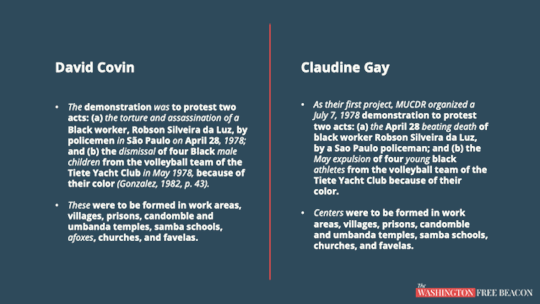
In a section called "Suggestions for Further Reading," Gay does include Andrews’s 1991 book, Blacks & Whites in São Paulo, Brazil, 1888-1988, but not his 1992 paper, "Black Political Protest in São Paulo, 1888-1988," from which the offending text was drawn.
The 1993 essay "concerns me less," Riley said, given how early it was in Gay’s career. "However, it shows a quantity of plagiarism so egregious that minimally Dr. Gay should stop putting it on her CV."
The two peer-reviewed papers, by contrast, are "much more serious," Riley said.
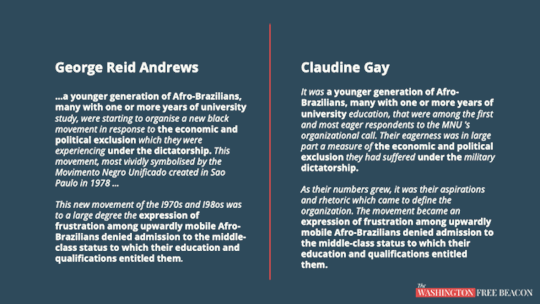
In "Moving To Opportunity: the Political Effects of a Housing Mobility Experiment," Gay borrowed language from a 2003 report by eight researchers—three of them Harvard economists—prepared for the Department of Housing and Urban Development.

And in "A Room for One’s Own? The Partisan Allocation of Affordable Housing," Gay borrowed language from a 2010 book by Alex Schwartz, Housing Policy in the United States, and from a 2011 paper by Matthew Freedman and Emily Owens, "Low-Income Housing Development and Urban Crime."
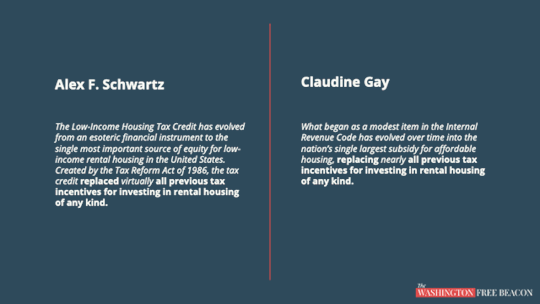
Freedman and Owens are never cited, though Gay thanks them for letting her use their data. Gay does cite Schwartz and the eight researchers elsewhere in "Moving to Opportunity" but not in the sentences where their quotes appear. None of the passages have quotation marks, creating the impression that they are Gay’s own language and ideas.
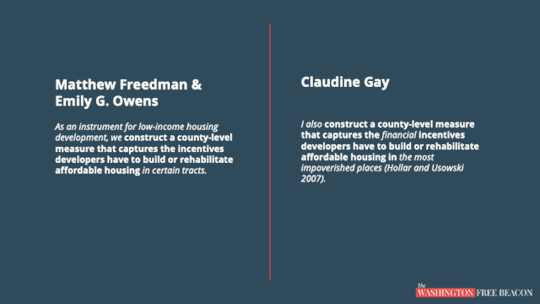
Some examples are more borderline than others, scholars who reviewed them said, but clearly violate Harvard’s guide on sourcing, which requires citations even when using "ideas that you did not think up yourself," regardless of how much the language has changed. Plagiarism, the guide adds, is "unacceptable in all academic situations, whether you do it intentionally or by accident."
Even crediting a source in the wrong sentence, as Gay did repeatedly, is a serious offense under Harvard’s policies. The school’s sourcing guide includes multiple examples of "mosaic plagiarism," in which placing a citation too late or too early in a passage causes "confusion over where your source's ideas end and your own ideas begin."
Gabriel Rossman, a sociologist at the University of California, Los Angeles, said that several portions of Gay’s work met the definition of "mosaic plagiarism" outlined in Harvard’s guide. So did Steve McGuire, a member of the American Council of Trustees and Alumni and a former professor of political theory at Villanova University, who said the examples "violate the expectations Harvard has for its own students."
"As a professor, I would not have accepted this kind of work from a first semester freshman," McGuire told the Free Beacon. "It’s appalling to see it in the work of Harvard’s president."
Rossman, who specializes in quantitative research, noted that some of the examples involve technical descriptions of statistical methods, which "can require very precise wording" and are often repeated between authors, a potentially mitigating factor. But an editor at one of the five most-cited academic journals in the world pushed back on that notion, arguing that even that sort of duplication in academic prose is difficult to defend.
"The text duplication points to carelessness, sloppiness, and short-cut taking," said the editor, who has edited journals in both the natural and social sciences.
Some of the victims of Gay’s plagiarism were more sanguine. Jeffrey Liebman, one of the Harvard economists who prepared the Department of Housing report, said he and four of his coauthors did "not see any signs of plagiarism." Like Rossman, he argued that it was defensible for scholars to crib technical descriptions from each other.
Gay "had the right to use and adapt this common language," he said.
Voss, who coauthored the 1996 paper with Palmquist, said that although the paragraphs Gay quoted were "technically plagiarism," they were "not terribly important" to her argument.
"If I caught a student doing that, I would tell them it was inappropriate," Voss said. "But I would never consider taking action against the student."
But Wood, the former Boston University associate provost, said the feelings of the plagiarized are irrelevant.
The "willingness of the actual author to go along with the copying (whether before the fact or afterwards) doesn't change the deceptive nature of the act of plagiarism," he said. "The plagiarist is breaking the trust of the community of readers. In the case of scholarship, the whole university community is the victim."
It is common for plagiarized authors to come to the defense of their plagiarizer, Wood said. When Princeton historian Kevin Kruse was accused of plagiarizing Ronald Bayor, a historian at Georgia Tech, for example, Bayor dismissed the accusations as "politically motivated."
Other cases of possible plagiarism—all from Gay’s dissertation—were uncovered Sunday by the Manhattan Institute’s Rufo and Karlstack’s Brunet. Though the revelations are new, rumors of Gay’s plagiarism have been circulating on econjobrumors.com, a popular message board for social scientists, since at least January 2023.
"Most plagiarists turn out to be serial thieves," Wood said. "If the offense is discovered in one publication, typically it will be found in others."
In a statement to the Boston Globe, Gay said she stood by the integrity of her scholarship.
The Harvard Corporation, which held an emergency meeting over the weekend after Gay’s disastrous testimony on Capitol Hill last week, did not respond to a request for comment.
Update 10:10 p.m.: An earlier version of this story incorrectly stated that Gay had not cited Alex Schwartz in the paragraph where his quote appears. She did cite him in that paragraph, but not in the sentence where she quoted him.
==
This is what happens when you hire for DEI, not merit.
In spite of all of this, Claudine Gay should not be fired for plagiarism, any more than Kendi should be rejected for his financial mismanagement. Because this misses the point.
Harvard's own paper, The Harvard Crimson, reports that over 700 staff and faculty are in support of her remaining on. They cite "university independence." Which should reasonably be taken as an agreement to no longer accept public funding, even though that level of integrity is not what they meant.
What the 700 supporters does indicate is how far and how extensively the ideological corruption has set in. That's the reason she should be dismissed. She should be let go because Harvard has decided to abandon intersectional DEI garbage as its primary telos, and to reclaim its academic integrity and rebuild its - perhaps irreparably - damaged reputation.
The problem is that, unsurprisingly, its council have officially chosen the intersectional DEI garbage over any pretence to integrity.

#Claudine Gay#Harvard University#Claudine Gay is corrupt#academic corruption#plagiarism#eradicate DEI#diversity equity and inclusion#diversity hire#diversity#equity#inclusion#DEI bureaucracy#unethical#ethics violations
14 notes
·
View notes
Link
96 notes
·
View notes